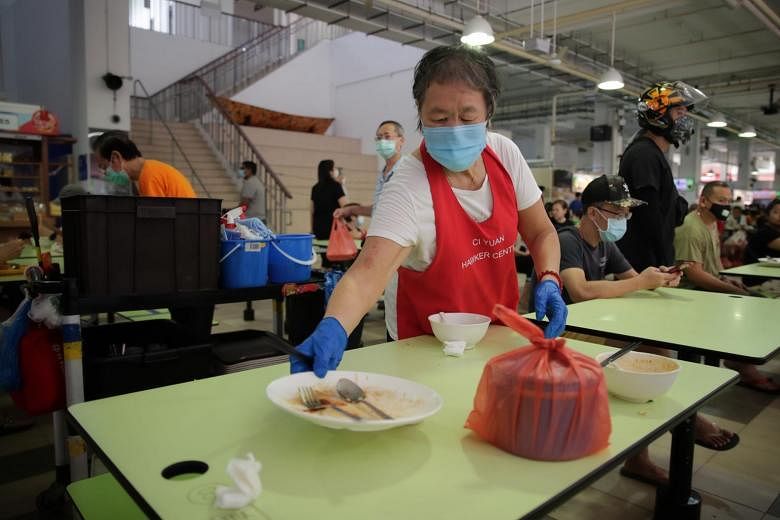SINGAPORE - A national survey on public hygiene has found that some 47 per cent of Singaporeans think that clearing their own tables after eating at public places can deprive cleaners of their jobs.
But this is not true, said Senior Minister of State for Sustainability and the Environment Amy Khor on Saturday (Feb 6).
She said: "There will still be cleaners needed to maintain and upkeep the general cleanliness and hygiene of the food centre... they will still have to wipe down and disinfect the tables.
"In fact, (diners returning their own trays) will help the cleaners, in terms of improving the welfare of the working environment."
She was speaking to reporters on Saturday after a visit to Yuhua Village Hawker Centre and Broadway Coffeeshop in Jurong East, to launch a national campaign to encourage people to clean up after eating in public food places.
The survey of 1,402 people conducted by the National Environment Agency (NEA) late last year had also found that 90 per cent of respondents felt that people should be required to do so.
And 76 per cent said they do return their trays and used crockery most of the time in such places.
However, the average tray return rate at most hawker centres is currently only around 30 per cent.
NEA said this indicates the actual practice on the ground does not reflect individual espoused behaviour when it comes to tray return.
Dr Khor said the Clean Tables Campaign, which aims to address this discrepancy, is timely due to the coronavirus pandemic.
She said: "Used tissues, wet wipes and the remnants left on the table - they are potential bio-hazards. And they pose a threat to the people who have to clear this up when we leave them behind on the table."
Cleaning up one's own table can potentially minimise the risk of infectious diseases spreading, she added.
During her visit, Dr Khor spoke to diners at the two food centres, and demonstrated the folding of an origami "dustbin" box to be used to collect food remnants and litter.
The NEA said: "In view of the current pandemic, NEA seeks support from the public to address table litter at our public dining places... Good public and personal hygiene is the first line of defence against diseases."
From this month, posters and other visual cues, as well as audio announcements, will be rolled out progressively to all 111 hawker centres, coffee shops and food courts in Singapore.
The NEA will also work with grassroots advisers, volunteers and educational institutions to reach out to the larger community, to foster greater ownership of dining places and encourage diners to keep public dining places clean.
It will engage some schools and their students to design special table wraps for selected hawker centres.
Mr Neo Swee Eng, 62, hawker association chairman at Yuhua Village Hawker Centre, said, on average, there are 12 cleaners deployed at the hawker centre daily.
"It is a matter of hygiene to return the trays, so that we do not attract birds which will come and eat the leftover food," he said.
Madam Cindy Chan, 65, a cleaning supervisor at Yuhua Village Hawker Centre, said diners there often return their trays.
She added: "It would be a great help if more people do it. We still have many things to do and we can just focus on things like cleaning and wiping down the tables."
Retiree Edmund Teo, 70, who was having breakfast at Broadway Coffeeshop, said he returns his trays.
He added: "We cannot rely solely on the cleaners because how many can you have? Many of them are also aged and mobility may be an issue.
"It should be a group effort - the cleaners as well as customers who are there, everyone must do their part."


